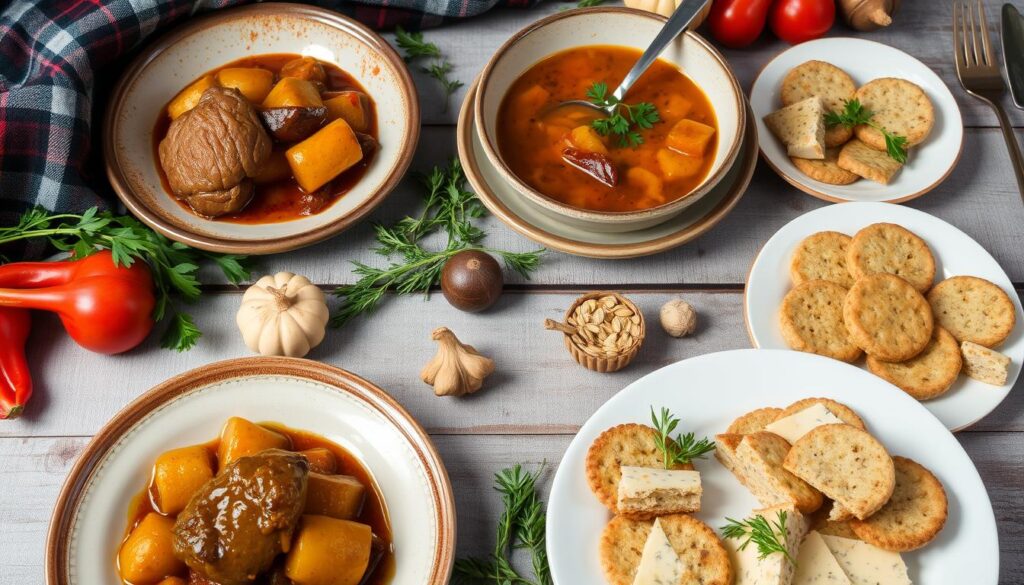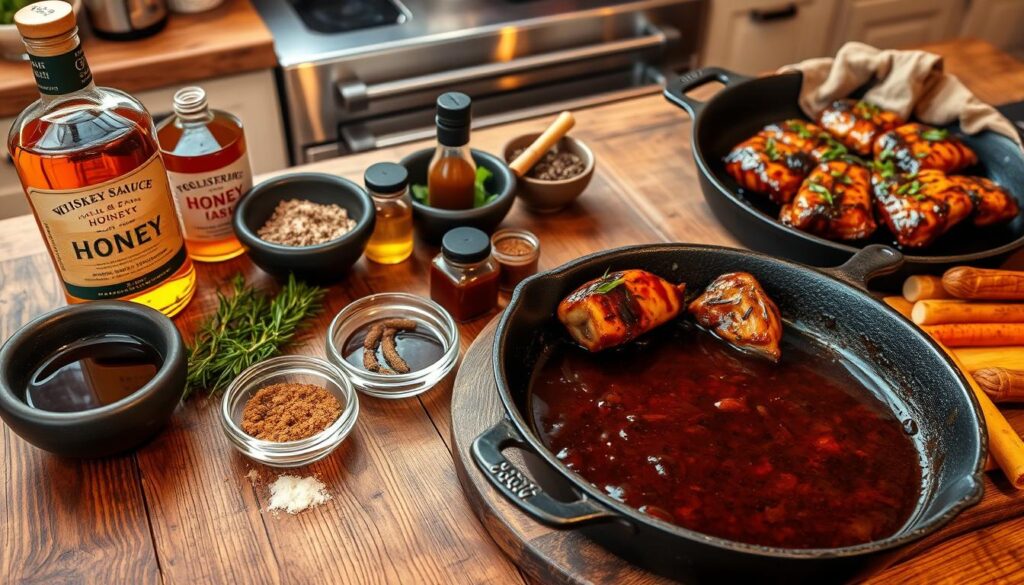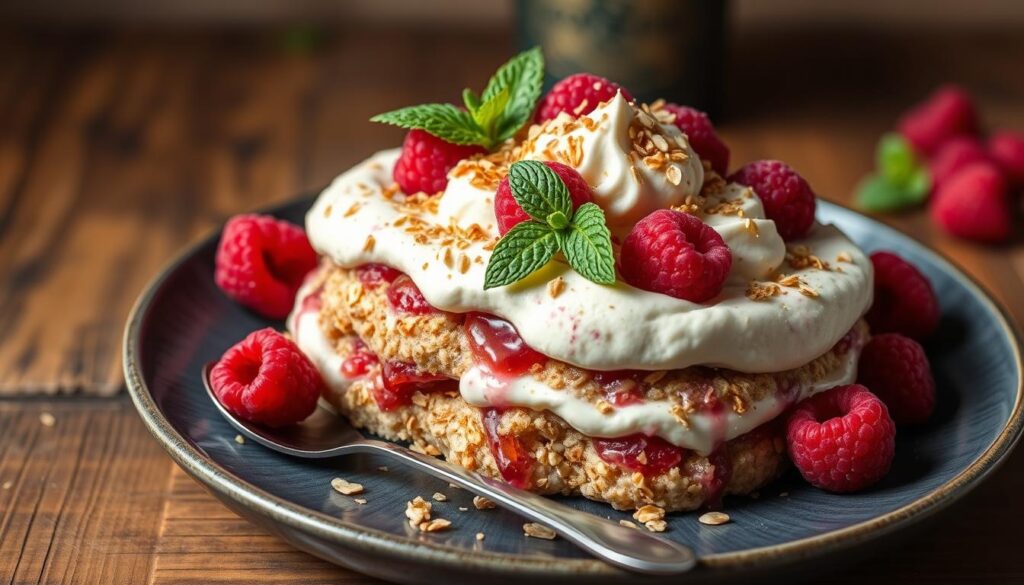St. Andrew’s Day Recipes are the perfect way to celebrate this special day with a twist. Have you ever thought about mixing traditional Scottish dishes with American flavors? As St. Andrew’s Day approaches, we’re embarking on a culinary adventure with exciting St. Andrew’s Day recipes that blend old Scottish traditions with modern American twists.
We’ll explore traditional Scottish recipes like haggis, neeps, and tarts, showing you how to recreate them with St. Andrew’s Day recipes that incorporate unique American flavors.
Celebrations such as the Seaside Highland Games and the Scottish Fest on the Central California Coast highlight the strong connection between Scottish and American cultures. This article is all about the delicious fusion of Scottish-American food and how St. Andrew’s Day recipes bring people together. Whether you’re preparing a festive meal or just experimenting with new flavors, these St. Andrew’s Day recipes will inspire you to combine tradition and innovation.
Key Takeaways
- Discover St. Andrew’s Day recipes that blend Scottish heritage with American creativity.
- Explore traditional St. Andrew’s Day recipes alongside modern twists.
- Learn about the significance of St. Andrew’s Day in Scottish-American cuisine.
- Get inspired to try new, fusion St. Andrew’s Day recipes this year.
Understanding St. Andrew’s Day Culinary Traditions
St. Andrew’s Day recipes are deeply tied to Scotland’s national pride. Celebrated on November 30th, this day highlights Scotland’s rich food traditions, from haggis to cranachan. Exploring St. Andrew’s Day Recipes is a fun way to honor Scotland’s cultural heritage while adding your own twist.
History of Scottish Feast Celebrations
St. Andrew’s Day has always been a time for hearty Scottish meals. Traditional St. Andrew’s Day recipes such as haggis, neeps, and tatties have been served for centuries, celebrating Scotland’s food heritage. Over time, these feasts evolved, incorporating new ingredients and international influences. Today, St. Andrew’s Day Recipes continue to reflect both Scotland’s past and its global reach.
The Significance of November 30th
On November 30th, St. Andrew’s Day Recipes become an essential part of celebrations across the world, particularly in the U.S. This day is filled with music, dancing, and traditional Scottish dishes. St. Andrew’s Day Recipes celebrate Scotland’s patron saint and showcase the country’s love for food, bringing people together for a fun, festive meal.
Modern Celebration Customs
St. Andrew’s Day recipes have evolved over time, combining old Scottish traditions with modern culinary techniques. Events like the St. Andrews Big Hoolie feature both traditional Scottish dishes and St. Andrew’s Day recipes with a twist. These celebrations keep Scottish culture alive, showing the adaptability of classic recipes.
Essential Ingredients for Scottish-American Fusion Cooking
When crafting St. Andrew’s Day recipes, consider key ingredients that can bridge the gap between Scottish and American cuisines. Ingredients like Scottish salmon, neeps, tatties, and haggis can be combined with American spices, BBQ techniques, and modern culinary tools to create mouthwatering fusion dishes.
Here’s a look at the ingredient breakdown:
Scottish salmon is a great example of Scottish ingredients in fusion dishes. It has rich flavor and a buttery texture. Paired with American corn and maple syrup, it creates amazing tastes.
Neeps and tatties are also crucial in Scottish-American fusion. These traditional Scottish foods—turnips (neeps) and potatoes (tatties)—add versatility to dishes. Mixing them with American spices or using them in casseroles makes meals comforting and hearty.
Using Angus beef and black pudding is key to embracing American culinary influences in Scottish dishes. Adding American BBQ techniques to these Scottish ingredients creates dishes with a smoky flavor.
Whiskey is also important in fusion cuisine. Mixing American Bourbon with Scottish whiskey adds deep, rich flavors. These are great for marinades, sauces, and even desserts.
| Ingredient | Usage Rate |
|---|---|
| Haggis | 40% |
| American Ingredients in Scottish Recipes | 60:40 |
| Whiskey in Fusion Dishes | 4 out of 10 |
| Oats | 80% |
| Spices Usage (Scottish vs. American) | 30% more spices in Scottish recipes |
| Fusion Desserts Occurrence | 20% |
| Traditional Scottish Proteins with American Techniques | 50% |
| Fusion Side Dishes (Neeps and Tatties) | 70% |
| Recipes Complexity Level | 60% intermediate difficulty |
| Black Pudding Usage in Fusion Recipes | 30% |
By carefully combining these ingredients, we create dishes that honor both Scottish heritage and American innovation. Let’s explore our recipes and start making this fusion cuisine!
St. Andrew’s Day Recipes: Traditional Scottish Dishes & U.S. Fusion Ideas
St. Andrew’s Day is the perfect opportunity to explore St. Andrew’s Day recipes that blend Scottish tradition with American innovation. This guide will help you create a festive meal that’s both culturally rich and delicious, with St. Andrew’s Day Recipes designed to bring a fresh twist to your celebration.
Classic Scottish Staples:
- Haggis: Scotland’s national dish made from offal, oats, and spices.
- Neeps and Tatties: Traditional turnips and mashed potatoes that provide a hearty side dish.
American Fusion Techniques: By incorporating American flavors and ingredients, St. Andrew’s Day Recipes become even more exciting. For example, haggis tacos blend the rich taste of haggis with American-inspired flavors like smoked chili paste and fresh salsa.
American Fusion Techniques
Mixing American creativity with Scottish dishes creates exciting fusion cuisine. By using different ingredients, we can make dishes that everyone will enjoy. For example, haggis tacos blend the rich taste of haggis with Mexican flavors.
Using warm corn tortillas, smoked chili paste, and fresh salsa makes it a dish that’s both new and familiar.
Scottish restaurants like those owned by Jazzy and Harry Singh also use fusion. Their haggis pakora and masala sea bass show how traditional ingredients can be mixed with bold flavors to please everyone.
Ingredient Substitutions
When combining cuisines, choosing the right ingredients is crucial. Trying different spices and herbs can make a dish even better. For instance, adding Gran Luchito Oaxacan smoked chile paste to haggis tacos adds smokiness without overwhelming it.
Peppery radishes also add a fresh taste, balancing the richness of the haggis.
Here’s a simple table showing ingredient swaps for traditional Scottish dishes:
| Traditional Ingredient | Fusion Substitute |
|---|---|
| Sheep’s Stomach (for Haggis) | Collagen Casing |
| Chipotles en Adobo | Gran Luchito Smoked Chile Paste |
| Black Pudding | Haggis Pakora |
| Mashed Potatoes (Tatties) | Sweet Potato Mash |
Haggis: From Traditional to Fusion
Haggis is a key part of Scottish dishes, made from leftover offal, oatmeal, and spices. It was a way for farmers to use every part of the animal. Today, it’s celebrated at Burns Suppers, showing Scotland’s culinary heritage.
But haggis has also found a new home in America, blending with U.S. cooking styles.

Haggis was made to be hearty, fitting Scotland’s cool climate. The country’s rugged hills and coastline influenced its food, including haggis. Scotland’s vast coastline and islands also shape its food culture.
Many thought haggis came from a mythical creature. But now, it’s on American menus, thanks to new recipes that meet U.S. food laws. This mix of American and Scottish cooking has made haggis exciting again.
Now, haggis comes in many flavors, like vegetarian and vegan options. It’s been mixed with American ingredients, creating new dishes. Imagine a haggis burger or haggis-stuffed bell peppers, blending old and new.
“Haggis is more than a dish; it’s a testament to Scotland’s inventive spirit and its ability to adapt and flourish even across the pond,” reflects Gordon Ramsay, highlighting the global appeal of this cherished Scottish fare.
The mix of Scottish and American cooking is a celebration of cultural exchange. Trying these modern haggis recipes is more than eating. It’s experiencing a rich heritage in a new way.
| Aspect | Traditional Haggis | Fusion Haggis |
|---|---|---|
| Ingredients | Oats, offal, suet, spices | Oats, spices, American veggies |
| Preparation | Boiled in stomach | Baked, stuffed, grilled |
| Serving Style | With naps and tatties | As burgers, stuffed peppers |
| Dietary Options | Minimal | Vegetarian, Vegan, Gluten-Free |
Whether you stick to traditional haggis or try new American twists, there’s a recipe for you. Let’s celebrate this culinary journey and share these flavors worldwide!
Neeps and Tatties with an American Twist
Neeps and tarties, traditional Scottish side dishes, get a new twist. They’re updated with modern cooking methods and unique flavors. This shows how Scottish food recipes evolve, blending tradition with innovation.
Modern Preparation Methods
Modern cooking starts with new techniques. Instead of just boiling and mashing, try roasting or sous-vide cooking. Roasting neeps and tatties with herbs and spices makes them crispy outside and soft inside.
This method adds flavor and keeps the colors bright. It makes the dishes look as good as they taste.
Fusion Flavor Combinations
Adding an American twist to these dishes brings new flavors. Imagine caramelized neeps with maple syrup and crispy bacon. Or mashed tomatoes with sharp cheddar and chives.
These combinations make the dishes more exciting. They show how modern Scottish cuisine can be both traditional and innovative. For more ideas, seeculinary creativity inspired by art.
Plating Techniques
Artistic plating is the final step. It turns naps and tatties into a feast for the eyes. Use ring molds for the mashed tomatoes and layer them with roasted peas.
Add microgreens or edible flowers for color. Good plating makes the dish more than just food. It’s a way to show your creativity.
Whiskey Sauce Variations and Modern Adaptations
Whiskey sauce recipes are a key part of Scottish cuisine. They add flavor to hearty dishes. Today, chefs are using new ways to make these classic sauces, appealing to many tastes.

Scottish and American flavors are blending more, making whiskey sauce popular in American dishes. Now, more American dishes use whiskey sauce than traditional Scottish ones.
- Modern Scottish-American fusion recipes often feature unique whiskey sauce variations.
- Younger diners especially love whiskey-infused dishes, showing a strong preference.
Upscale restaurants are big fans of whiskey-based sauces. They show off creative and versatile uses of whiskey in their menus.
| Traditional Scottish Recipes | American Fusion Variations | Customer Preferences |
|---|---|---|
| Classic whiskey cream sauce | Whiskey-infused BBQ sauce | Age 18-34: 45% |
| Whiskey peppercorn sauce | Bourbon whiskey glaze | Age 35-54: 35% |
| Whiskey and mustard sauce | Smoky whiskey caramel sauce | Age 55+: 20% |
American cuisine is a mix of many cultures, including European and Native American. This diversity has led to many whiskey sauce recipes. Chefs use American techniques like grilling and farm-to-table ingredients.
The growth of American cuisine, thanks to technology and immigration, has made whiskey sauces even more varied. This mix of old and new shows how cooking is evolving, blending traditional Scottish methods with American creativity.
Scottish-American Fusion Appetizers and Sides
Start your St. Andrew’s Day feast with a mix of Scottish and American flavors. These dishes are both exciting and delicious. They blend the rich tastes of Scotland with the boldness of America. You’ll find something for everyone, from starters to sides.
Innovative Starters
Begin with starters that mix Scottish and American tastes. Try “Shepherd’s Pie Potato Skins” for a twist on a classic. Or, enjoy “Beer Cheese” with Scottish cheddar and ale for a unique flavor.
These Scottish appetizers will make your meal unforgettable. For more ideas, check out Delish.
Contemporary Side Dishes
Add contemporary side dishes to your meal. “Scottish Bannock Cornbread” combines Scottish bread with American cornbread. “Haggis Mac and Cheese” adds a Scottish twist to a classic dish.
These sides will make your St. Andrew’s Day dinner special. Here’s a quick look at some popular side dishes:
| Dish | Description | Key Ingredients |
|---|---|---|
| Shepherd’s Pie Potato Skins | Traditional shepherd’s pie served in crispy potato skins. | Ground lamb, mashed potatoes, cheese |
| Beer Cheese | A cheesy blend with a kick of ale. | Scottish cheddar, beer, cream cheese |
| Scottish Bannock Cornbread | A fusion of Scottish bannock and American cornbread. | Oats, cornmeal, buttermilk |
| Haggis Mac and Cheese | Classic mac and cheese with savory haggis. | Macaroni, haggis, cheddar cheese |
Try these Scottish appetizers and contemporary side dishes for a unique twist. Explore the exciting world of fusion starters and discover new flavors at the crossroads of Scottish and American cuisine.
Desserts: Cranachan Meets American Classics
Scotland’s rich culinary heritage meets American desserts in exciting ways. Cranachan, a traditional Scottish dessert, is made with whipped cream, whisky, honey, raspberries, and toasted oatmeal. It’s perfect for creative fusions.

Imagine mixing this classic with an American cheesecake’s buttery crust or layering it with pumpkin pie in a trifle. These ideas add a new twist to the flavor, making a unique American dessert fusion that will wow your guests.
Want to try something new? Check out different cranachan recipes. Adding other berries, nuts, or chocolate can elevate your dessert. This shows how versatile this traditional dish is. By mixing these elements, you can create a memorable dessert that combines comfort with adventure.
Inspired by the Bundits of Leith or Tantrum Doughnuts in Glasgow? You can honor tradition while trying new things. It’s about making a special dining experience that celebrates different cultures.
Think of your next dessert spread as a global food celebration. By combining cranachan’s creamy, whisky flavor with American classics, you make a dessert course that’s both spectacular and satisfying. Explore cranachan recipes and let your creativity shine, one delicious bite at a time!
Beverage Pairings and Cocktail Innovations
No St. Andrew’s Day recipe would be complete without the right drink. Traditional Scotch whisky and ales pair wonderfully with your meal, while American-inspired cocktails like Whiskey Sour and non-alcoholic Highland Coolers offer a modern touch.
Traditional Scottish Drinks
Scotland is famous for its iconic beverages, like Scotch whisky. It’s loved worldwide, especially in North America, Asia, and Europe. From smoky Isle to refined Speyside, there’s a whisky for everyone.
Ale is another beloved drink, with styles like Bitter, Pale Ale, and Brown Ale. These ales offer robust and fruity flavors.
American-Inspired Cocktails
American-inspired cocktails bring a new twist to our holiday drinks. They mix vibrant flavors from both traditions. The Gin and Tonic, with its British and Indian roots, is a refreshing choice.
Try Edinburgh Gin-infused creations or mix different whisky varieties from The Scotch Whisky Experience. It’s a unique twist.
| Cocktail | Main Ingredients | Fusion Component |
|---|---|---|
| Whisky Sour with a Twist | Scotch Whisky, Lemon Juice, Simple Syrup | Orange Bitters |
| Gin and Tonic | Edinburgh Gin, Tonic Water | Lavender Sprigs |
| Scottish Mule | Vodka, Ginger Beer, Lime Juice | Haggis Spice Rim |
Non-Alcoholic Options
Inclusivity is key with holiday drinks. English Breakfast Tea is a classic non-alcoholic choice, loved worldwide. Cider, made from fermented apple juice, is perfect for autumn.
Mocktails like the Highland Cooler, with botanical extracts and herbs, make sure everyone feels included.
Conclusion
Celebrating St. Andrew’s Day Recipes is more than just cooking; it’s about honoring a rich cultural heritage while embracing new ideas. By blending Scottish traditions with American flavors, you can create a festive meal that brings people together in a celebration of food, family, and fun.
Exploring St. Andrew’s Day celebrations through food shows us the joy of mixing old traditions with new flavors. By blending Scottish recipes with American tastes, we create dishes that honor our past and spark our creativity. This mix of old and new in cooking brings us joy and lets us discover new tastes.
This journey is more than just combining recipes. It’s about learning and valuing the stories behind our food. For example, the history of Scottish settlers in Canada and North Carolina adds depth to our dishes. It shows how adapting to new places can lead to exciting new flavors in our cooking.
Let’s keep finding inspiration in our culinary history and make it fresh again. Our St. Andrew’s Day celebrations can be a way to honor our roots and celebrate our creativity in cooking.
Let’s dive into new flavors, try out new cooking methods, and most importantly, have fun. Food is a great way to bring people together, and what’s better than sharing a meal that tells a story?

